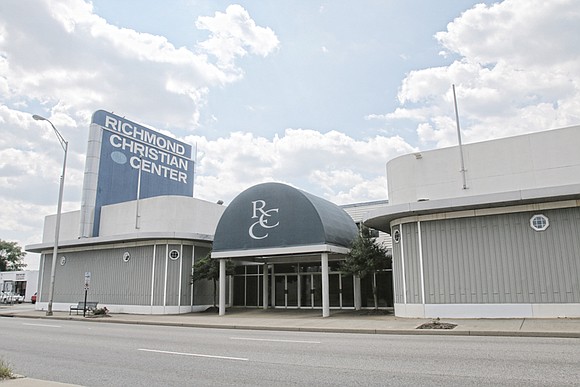Richmond Christian Center again facing sale
8/4/2017, 9:31 a.m.
By Jeremy M. Lazarus
The Richmond Christian Center, still struggling to emerge from bankruptcy after nearly four years, once again is facing the loss of its property in South Side.
A court-appointed trustee, Bruce H. Matson, wants to sell the RCC property to pay off creditors.
Separately, Foundation Capital Resources, a Missouri-based church lender that is RCC’s main creditor is still owed $2.2 million. It is seeking court approval to foreclose on 16 parcels the church owns, including RCC’s sanctuary at 214 Cowardin Ave.
The church owes about $2.6 million to creditors. As of June 30, RCC had repaid about $257,598.
U.S. Bankruptcy Judge Keith L. Phillips has set a hearing for Wednesday, Aug. 16, to consider which route to take.
Rhonda Hickman, chair of the RCC Trustee Board, and Calvin Yarbrough, who also is a member of the board, did not respond to Free Press requests for comment.
RCC filed for bankruptcy protection in November 2013 when its founder, Stephen A. Parson, was still the church’s pastor. The case has taken numerous twists and turns since then.
After being appointed trustee in January 2015, Mr. Matson crafted a plan of reorganization that the court accepted in January 2016. It allowed the church to pay off its debts, including the loan, and RCC to emerge from bankruptcy after two years.
RCC’s leaders expected that projected outcome to result in an “increase in enthusiasm for the church and a growth in membership tithes and offerings,” Mr. Matson stated in a recent filing.
But in the 15 months since the plan was approved, membership has declined, Mr. Matson stated, in part because of a schism in the congregation that he stated was caused by Mr. Parson.
Mr. Matson reported that Mr. Parson continues to publicly proclaim his return to RCC despite being fired by the church, “inhibiting (RCC’s) ability to add new members and increase giving.”
Additionally, the income from RCC’s efforts to rent its property to other churches and small businesses, including a women’s exercise program and a youth basketball program, ultimately has not brought in enough money, Mr. Matson stated.
Initially, RCC secured commitments from seven tenants and expected to earn $17,600 monthly from leases. But the amount collected remains at $10,000 a month, and four of the tenants have left, Mr. Matson stated.
Rental income also was reduced because of a dispute between RCC and a day care tenant that resulted in a financial loss, he stated. Income also suffered because of a separate dispute between RCC and its property manager, Ujima Properties LLC, over remittance of rent.
However, a partner with Ujima Properties painted a different picture in response to a Free Press query. Relations between Ujima and the church remain strong, and the rental of the church campus is progressing, according to Michelle Tinkler, a partner in the company.
“The church’s once quiet campus is now vibrant, teeming with weekly activity that involves more than 1,000 people,” her statement read. “Ujima’s commitment is one of the reasons why RCC is still existing today.”
According to Ms. Tinkler, since May 2015 when the first three tenants moved to the campus, “Ujima Properties has successfully filled 90 percent of the tenant vacancies. RCC can now boast that 15 tenants will occupy the space by September of this year, and that currently there is a waiting list for future openings.”
In addition, she stated “the Royal Manchester Event Center (the renamed church banquet and fellowship space) is in demand, with clients booking events well into 2018.”
Mr. Matson stated the most serious issue has been RCC’s inability to restructure the FCR debt to reduce monthly payments, a centerpiece of the reorganization plan.
Instead of bearing fruit, negotiations between FCR and RCC stalled, and none of the required documents, including a deed of trust on all of the RCC’s property in favor of FCR, have been recorded as the plan required, Mr. Matson stated.
So despite reporting nearly $168,000 in the bank as of June 30, RCC has stopped making payments to FCR and has not made required payments to other creditors, including unsecured creditors, Mr. Matson stated.
In his view, the plan of reorganization that the court approved “is unworkable,” Mr. Matson stated.
In 2014, Judge Phillips ordered the sale of the property, but halted its transfer to another church that was ready to buy after Mr. Matson was appointed and created the reorganization plan.
Mr. Matson stated that a sale is now the best prospect to raise the most money. He stated that interest in the RCC property should be high because of its location in the part of Manchester undergoing revival, ensuring “a robust sale” that could raise enough money to pay off FCR and other creditors.
He promised to move swiftly to hold a new auction of the property if the court approves the sale of the property.
FCR, for its part, wants Judge Phillips to order RCC to carry out its deal to file a deed of trust in favor of the lender on all of its property to enable foreclosure.
Among other things, the lender states that RCC stopped paying on the FCR loan in April, which is confirmed by RCC’s latest financial report. FCR states it needs to be allowed to foreclose on the property to protect its interest, but the company cannot foreclose because RCC has not filed the necessary legal documents.







